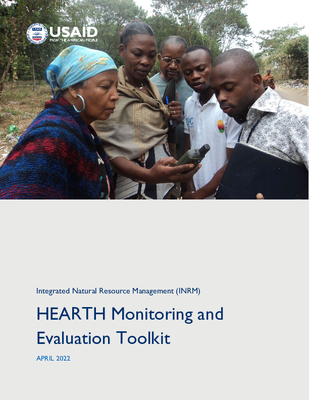HEARTH Monitoring and Evaluation Toolkit
This resource is a cross-sectoral monitoring and evaluation toolkit designed for the Health, Ecosystems, and Agriculture for Resilient, Thriving Societies (HEARTH) Global Development Alliance. This toolkit packages a suite of indicators and guidance as customizable modules for different sectors—including biodiversity conservation and climate change, food security, health, governance, and economic growth—so that individual HEARTH activities can apply the modules most relevant to their work. The modules draw on global best practices in each sector to allow robust and consistent measurement of a broad range of outcomes for integrated programs.
https://www.biodiversitylinks.org/projects/current-global-projects/integrated-natural-resource-management-inrm/usaid-hearth-monitoring-and-evaluation-toolkit-2022-4-508.pdf/view
https://www.biodiversitylinks.org/projects/current-global-projects/integrated-natural-resource-management-inrm/usaid-hearth-monitoring-and-evaluation-toolkit-2022-4-508.pdf/@@download/image/image.png
File
HEARTH Monitoring and Evaluation Toolkit
This resource is a cross-sectoral monitoring and evaluation toolkit designed for the Health, Ecosystems, and Agriculture for Resilient, Thriving Societies (HEARTH) Global Development Alliance. This toolkit packages a suite of indicators and guidance as customizable modules for different sectors—including biodiversity conservation and climate change, food security, health, governance, and economic growth—so that individual HEARTH activities can apply the modules most relevant to their work. The modules draw on global best practices in each sector to allow robust and consistent measurement of a broad range of outcomes for integrated programs.
HEARTH Toolkit Indicator Modules

Agriculture and Land
Indicators, including guidance and Performance Indicator Reference Sheets (PIRS), for HEARTH programs focused on increased agricultural productivity, improved agricultural livelihoods, and better land and resource governance.
Read more

Biophysical
Indicators, including guidance and PIRS, for HEARTH programs focused on conserving ecosystems and high-biodiversity landscapes, including both biotic and abiotic components.
Read more

Conservation Enterprise (CE) Benefits
Indicators, including guidance and PIRS, to assess benefits to individuals directly participating in HEARTH conservation enterprise programs, as well as benefits to the wider community.
Read more

Food Security and Nutrition
Indicators, including guidance and PIRS, for HEARTH programs designed to improve food security, diets, and nutrition.
Read more

Gender Equality and Inclusion
Indicators, including guidance and PIRS, for HEARTH programs designed to increase women’s participation in decision-making, reducing gender-based violence, and supporting the inclusion of marginalized populations.
Read more

Governance
Indicators, including guidance and PIRS, for HEARTH programs related to improved governance, including community participation, rights/security, resolution mechanisms, and monitoring/enforcement.
Read more

Health
Indicators, including guidance and PIRS, for HEARTH programs related to improving access and use of healthcare services, such as family planning services, maternal health services, treatment for children, and other health outcomes.
Read more

Conservation Knowledge, Attitudes, and Practices
Indicators, including guidance and PIRS, for HEARTH programs designed to raise awareness or otherwise demonstrate the benefits of conservation and natural resource management.
Read more

Private Sector Engagement
Indicators, including guidance and PIRS, for HEARTH programs to facilitate measuring the number of USAID engagements with the private sector and the amount of investment leveraged from the private sector.
Read more

Resilience
Indicators, including guidance and PIRS, for HEARTH programs designed to increase household resilience to shocks and stresses through various pathways, including increased incomes, access to finance, social capital, and access to natural resources.
Read more

Socio-economic Well-being
Indicators, including guidance and PIRS, for HEARTH programs seeking to increase socio-economic well-being through pathways such as employment, participation in a conservation enterprise, greater agricultural productivity, and increased access to finance.
Read more



